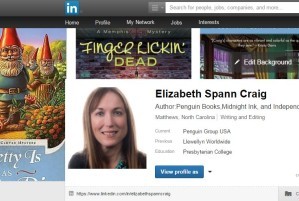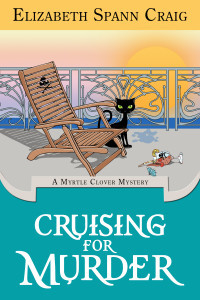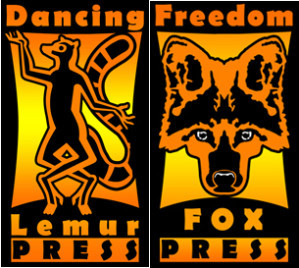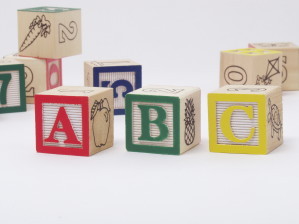Elizabeth Spann Craig's Blog, page 106
April 30, 2016
Twitterific Writing Links
by Elizabeth S. Craig, @elizabethscraig
Twitterific writing links are fed into the Writer’s Knowledge Base search engine (developed by writer and software engineer Mike Fleming) which has over 30,000 free articles on writing related topics. It’s the search engine for writers.
(developed by writer and software engineer Mike Fleming) which has over 30,000 free articles on writing related topics. It’s the search engine for writers.
5 Steps to Get Started Writing Today: http://ow.ly/4nhjRm @charityscraig
Evoking Emotions in Readers: http://ow.ly/4mPSjW @JamiGold
Forum Highlights ‘Challenges in publishers grappling with consumer data’: http://ow.ly/4nhkGm @Porter_Anderson @DouglasMcCabe
When to Start a Sequel: http://ow.ly/4mPSnb @Janice_Hardy
Writing Believable Action Scenes: http://ow.ly/4mPSpF @NakedEditor
The Duplicity of A Character’s Desire: http://ow.ly/4mQEBb @MichelleHoover_
Methods to Avoid Authorship Problems: http://ow.ly/4mQFfM @theindiepubmag @roserose_sc
Facing the Edits: 7 Steps to a Happy Revision: http://ow.ly/4mQFds @j_s_brown
The BISAC Subject Heading List: http://ow.ly/4mQEHQ by Lynellen Perry
What It’s Like to Score a Kindle Scout Book Deal: http://ow.ly/4mQFzw @KenBrosky
On Horror, Disability, and Loving Both at Once: http://ow.ly/4mQFLH @FosterOfTheWeek
Ways to end a horror story: http://ow.ly/4mQFB2 @RayneHall
What Does Self-Pub Cost? http://ow.ly/4nhl1M @Porter_Anderson @ReedsyHQ @EmmanuelNataf
3 Cinematic Techniques for Your Scene Opening: http://ow.ly/4mQFtS @CSLakin
5 Great Folk Horror Novels: http://ow.ly/4mQFDZ @northerain
Why Fiction Authors Benefit from Indie Publishing: http://ow.ly/4mQJu4 @writerswrite01
How You Make Something Good in Creative Work: http://ow.ly/4mNUCz @ursulaleguin @brainpicker
Screenwriting: Does the hero have fun to exemplify the concept’s appeal? http://ow.ly/4mNTW2 @CockeyedCaravan
How to Give a Critique: http://ow.ly/4mNUS4 @AnnetteLyon
How to Write a Short Story (That’s Actually Short) http://ow.ly/4mNVAr @ink_and_quills
5 Stages: Overcoming Writer Perfectionism: http://ow.ly/4mNUI0 from Blonde Write More
Being Intentional With Our Free Time: http://ow.ly/4neFJU
2 Tips For Finding Story Question: http://ow.ly/4mNUYf by Carrie Lynn Lewis @IndiePlotTwist
The cost of a good plot: http://ow.ly/4neAZT @p2p_editor
Finding your story’s theme: http://ow.ly/4mNUpJ @SPressfield
Women Detectives in Fact and Fiction: http://ow.ly/4neAJc @Erika_Janik @thelithub
22 Tips For Self-Editing: http://ow.ly/4mNViW @GarryRodgers1
Tips for introverts for being more comfortable at conferences: http://ow.ly/4mNVpt @gigirosenberg
The Magic of Fantasy: Love the Unreal: http://ow.ly/4mNVNn by Sheila Wisz Ellayn
The Metrics of Writing: http://ow.ly/4mNVY4 by John Wong
Outlining Your Novel: Brainstorming Your Premise: http://ow.ly/4mNWa7 @ScholarlyFox
Really Going There as a Writer: http://ow.ly/4mNUjZ @AnnieNeugebauer
Asking Bloggers to Review Your Book: http://ow.ly/4mNVaV @DanielleLHanna @IndiePlotTwist
Because A Lady Asks Me: On Poetry & Money: http://ow.ly/4mNWyu by Jennifer Moxley @PoetryFound
By the halfway mark, are character decisions driving plot instead of external plot complications? http://ow.ly/4mNU8p @CockeyedCaravan
10 Musicians Who Could Be Novelists: http://ow.ly/4ndD4a @likaluca @thelithub
How Sylvia Plath’s Rare Honors Thesis Helped 1 Writer Understand His Divided Self: http://ow.ly/4nbLI5 @nathansmithr
On the Heartbreaking Difficulty of Getting Rid of Books: http://ow.ly/4nbLHU @summerbrennan @thelithub
Imposter Syndrome and the Writing Community: http://ow.ly/4mMw5j @jules_chronicle
Countdown Deals and KDP Select Free Promos: http://ow.ly/4mMvwZ @ChrisDMcMullen
Creating Tension: Raise the Stakes: http://ow.ly/4mMw9B @ShanDitty
6 Ways to Make Your Villain Likable: http://ow.ly/4mMvXY @mythcreants by Chris Winkle
How To Market Your Book Using Content Marketing in 5 Steps: http://ow.ly/4mMvuq by Ricci Wolman
How to Avoid Middle Slumps: Maintaining Tension in Your Story: http://ow.ly/4mMw1W @writeabook
Creating Emotional Connections With Readers: http://ow.ly/4mMw6G @AngelaAckerman
7 Public Speaking Tips: http://ow.ly/4mMvLG @playthepartbook
Want a Page-Turner? You Need Deep POV: http://ow.ly/4mMwgL @MarcyKennedy
5 Video Editing Apps To Improve Your Content Marketing: http://ow.ly/4mMvJx @kikolani
How to Submit to Literary Journals: http://ow.ly/4mMwcs @ChelseaLHenshey
How Writers Can Deconstruct to Nail Genre: http://ow.ly/4mMw0p @CSLakin
Secrets of the Book Designer: The Many Ways a Cover is Rejected: http://ow.ly/4naKRM @erikinternet @thelithub
Writing About History: Truth or Dare: http://ow.ly/4mL9FR @NatachaTormey
Wellness for writers: tips for physical and mental strength: http://ow.ly/4mMvgh @JTTwissel
Manage Your Energy So You Can Write: http://ow.ly/4mMve0 @annkroeker
7 Must-Have Features for Great Author Website Design: http://ow.ly/4mMuXy @ferol
Amazon Marketing Services (AMS) for KDP Select: http://ow.ly/4mMv4R @ChrisDMcMullen
How to Tap Into Writing Mode Anywhere: http://ow.ly/4mL9H1 @ejwenstrom
What’s in Your Bag of Tricks? http://ow.ly/4mL9J6 @kristanhoffman
The Fool’s Journey: http://ow.ly/4mL9KQ @EvaDeverell
5 Words Writers Should Stop Using Immediately: http://ow.ly/4mL9xF @Chris_Kokoski
Finding Poetry In Computer Code: http://ow.ly/4mL9Pr @adearinthewoods
Knowing Your Character Inside and Out: http://ow.ly/4mL9AI @Lgood67334
Author Readings And Why You Should Go To One: http://ow.ly/4mL9QH @helpfulsnowman
On Publishing in India: ‘21,000 Retailers Sell Books Here’: http://ow.ly/4n6t2t @DennisAbrams2
15 Tips On Close Reading: http://ow.ly/4mINW2 @SCarverAuthor
5 Tips To Sustain You While Querying: http://ow.ly/4mIV5n @kcraftwriter
Worldbuilding About, Through, and With Autism: http://ow.ly/4mIOFF @xasymptote
The night Mark Twain brought Huck Finn alive: http://ow.ly/4n3EEf by Richard Zacks @Salon
Keeping a Journal Makes You a Better Writer: http://ow.ly/4mIOjx @WritingForward
New Imprints for Romance Novels in Denmark: http://ow.ly/4n6sLa @MarieBilde @pubperspectives
Dealing with the Editorial Report: http://ow.ly/4mIRdg by Juliet Marillier
How to Write a Poem in 10 Easy Steps: http://ow.ly/4n6nw6 by Skila Brown
How to blend a parallel, allegorical fantasy plot into your novel: http://ow.ly/4n6sBI @Roz_Morris
Merchandising Rights In Publishing Deals: http://ow.ly/4mIV6I @SusanSpann
Grand Finales: Tips for Writing Great Endings: http://ow.ly/4mIOtx by Alan Rinzler
Are pre-orders always right for authors? My interview with @SteveCampbellFL: http://ow.ly/4n6rqe
Top 10 books written about books: http://ow.ly/4n3EtE @GuardianBooks @jonathancoe
Make Your Novel More Relevant: http://ow.ly/4mIOcy @DonMaass
Make Strong Writing Stellar: http://ow.ly/4mL9qT @MargieLawson
10 Types of Prewriting: http://ow.ly/4mL9tE @JillWilliamson
Are You a Writer or a Storyteller? http://ow.ly/4mL9il @McgannKellie
Writing Lessons from Gone With The Wind: http://ow.ly/4mL9nZ @kimberlydbrock
Checking Out Books Under Al-Qaida’s Nose: Timbuktu’s ‘Badass Librarians’: http://ow.ly/4n3EkX @nprbooks
3 Ways To Add the Sizzle to Fiction That’s Fizzled: http://ow.ly/4mIR6X @KristenLambTX
The Pulp Fiction Dime Novel Is Making a Comeback: http://ow.ly/4mINOU by Parker Richards
5 Tips to Help You Write What You Know: http://ow.ly/4mIOnC @HeidiAngell
Tips for Writing a Query That Gets Read: http://ow.ly/4mITkI by Jeanne Kisacky
An agent on pitching stories: http://ow.ly/4mITcf @marielamba
How To Write Irresistible Prose: http://ow.ly/10Erhn @Chris_Kokoski
In Praise of Remixing Shakespeare: http://ow.ly/4n3Ebs by Andrew Hartley @unccharlotte @thelithub
Pre-Orders: Are they Always A Good Idea? http://ow.ly/4n3phT @SteveCampbellFL
How much does it cost to self-publish a book? @ReedsyHQ shares its data: pic.twitter.com/iDxezOZ3KB http://goo.gl/IiGPGT
3 Tips To Improve Your Writing Routine: http://ow.ly/10Erjn @rsmollisonread
Do You Know Where Your ISBNs Are? (Free Logbook Download): http://ow.ly/4mIV8O @JFbookman
3 Scrivener Tips to Become a Master Outliner: http://ow.ly/4mHEfB @jslauthor
Using Google calendar to simplify life and set goals: http://ow.ly/4n3ov9
7 Ways to Jumpstart an Author Platform: http://ow.ly/10ErAI @EmilyWenstrom
11 Reasons Indie Authors Need Social Media (And How to Get It Right): http://ow.ly/10Es9f @CaballoFrances
How To Maximize Goodreads Giveaways: http://ow.ly/10ErUd @Bookgal
3 Most Important Elements of Chapter One: http://ow.ly/10ErYg @EmilyWenstrom
Tech Tip for Writers: The 3-Click Rule: http://ow.ly/10ErWw @WordDreams
Last week’s links: http://ow.ly/4n2aXg . All the links I’ve ever shared (35K+, free and searchable): writerskb.com @Hiveword
Q&A with Literary Agent Juliet Pickering of the Blake Friedmann Agency: http://ow.ly/10Dz5m @MMFinck
DIY Memoir: http://ow.ly/10DySV @cbramkamp
Create a Compelling Character Arc: http://ow.ly/10DD6X @KathyEdens1
Best Character for Telling Your Story, Basic Action, Weakness and Choice: http://ow.ly/10Es04 @mileconnors
Why writers should be on LinkedIn: http://ow.ly/10Erwo @LisaJJackson
A short exercise to get you started thinking about your author brand: http://ow.ly/10EsdL @standoutbooks
4 Reasons to Be Intentional With Your Free Time: http://ow.ly/10Ermf @emily_tjaden
The top writing links of last week are on Twitterific:
Click To Tweet
The post Twitterific Writing Links appeared first on Elizabeth Spann Craig.
April 28, 2016
Being Intentional With Our Free Time
by Elizabeth S. Craig, @elizabethscraig
I don’t know about y’all, but I’ve had a very tough time finding time to just relax the past few years.
Part of the problem is that, when I’m not busy with mothering, driving my daughter to various activities, and managing the household, I’m writing, working on my website, figuring out marketing techniques…basically filling any available time up completely.
Part of the problem is that now I have a hard time relaxing in general. I’m very restless during quieter times and I have that overwhelming feeling that I should be working on something. Frequently I’ll jump up after five minutes or so and unload the dishwasher. That kind of thing.
I even wrote a character with this trait: Beatrice in the Southern Quilting mysteries. She can’t relax and can’t seem to make her retirement restful.
I read an article by Emily Tjaden called “4 Reasons to Be Intentional With Your Free Time.” When I curate links on Twitter, sometimes there’s an article that I’ll put to the side–I’ll drag the tab off to the side–and read it again later. This was one of those articles. Because, although I think I subconsciously realized most of the things that she was saying in her post, it resonated with me because I now realized this was something I could be mindful about and possibly help mitigate.
Tjaden says in her post that we can burn through our free time by randomly checking our emails and social media and news stories. I’m certainly guilty as charged.
But I’ll take that even a step further. Frequently I want something to read or watch that will keep me completely engrossed and tame my restlessness. But then I blow through my free time trying to remember that book title or that old movie that should be available on Netflix. Sometimes I blow it catching up on emails or aimlessly scrolling through social media.
I’ve made a couple of adjustments in my approach in the last week and it’s worked really well for me. I feel as if I’m maximizing my free time.
Now I’m maintaining a TBR list of what I most want to read. My library allows me to add a book to a “read later” list, which is a nice feature. And, yes, sometimes I’ll go ahead and purchase a book as I hear about it and have it ready and loaded on my Kindle.
I’m also maintaining a list of online movies and documentaries that I’d like to view. I research sites that review and recommend movies and add the films to my “watchlist.” Even PBS allows me to do this now…a new feature on their site.
This way, when I’m ready to take a break and genuinely recharge, I can quickly pull up a book I’m eager to read or a video I’m excited to watch. After doing this the last week, the results have been really amazing. I don’t have that stressed out feeling after my “downtime,” and I really feel more rested and ready to move back into my work. I actually feel recharged, which hasn’t happened for a while.
How do you manage your free time? Do you ever find yourself too keyed up to relax?
Being intentional with free time can help us be more relaxed:
Click To Tweet
Image: MorgueFile: PippaLou
The post Being Intentional With Our Free Time appeared first on Elizabeth Spann Craig.
April 24, 2016
Google Calendar to Simplify Life and Set Goals
by Elizabeth S. Craig, @elizabethscraig
I’ve become something of a Google calendar fanatic. I’ve completely outsourced my memory to it and have it open much of the day on my laptop and phone.
I used to love having a printed calendar, but disliked having to carry it with me for those frequent times that I needed to check it when I was away from the house. Printed calendars meant that I usually still had to keep the bits of paper clutter associated with the calendar entry (the slip that listed all the food allergies on the soccer team when I’m in charge of snacks, etc.)
With Google calendar, I either copy-paste the detailed information for the appointment or task and add it to the “notes” section of the entry, or I transcribe the details/contact info on the paper. Then I toss the piece of paper away. Having all of the information in one place saves me a lot of time and throwing away paper helps keep my house from getting cluttered.
The ability to have the calendar with me at all times (since I always have my phone with me), has really helped me to minimize conflicts and keep on task each day.
Google calendar (free app) helps me keep track of everything: events, appointments, chores, my grocery list, weekly menus, and family and friend birthdays.
There are also some helpful writing-related applications for the app:
I add a mini-outline each day on the calendar so I know what I’m planning on writing that day (and can grab a few extra minutes to write when I’m out of the house and having to unexpectedly wait on something or someone). Just jotting a line or two down can give me enough direction so that I know what I’m writing next.
I put the editorial calendar for this blog on my Google calendar.
I like adding goals to the calendar using the new goals feature. Google recently released a new goals feature for its calendar. You can schedule in your writing goals or reading goals, or even personal goals for exercise, etc. You add the goal, tell Google how often and what the best general time of day is to complete it, and Google schedules it into available time on your calendar. When the goal reminder pops up, you can defer it or mark it as completed . Google learns what times work better for you when you defer, edit, or complete goals.
Using the calendar as a crutch to outsource my memory and important tasks also helps me feel less stressed out and more creative. Whenever I read about helpful plugins on WordPress or a smart way to optimize my Amazon book pages, I used to feel that I needed to drop what I was doing and work on the task while it was fresh on my mind. Not only did this put me behind, it also stressed me out because I wasn’t finishing one task before beginning another. Now I’m scheduling these types of tasks in the future on my calendar and adding the links to the helpful articles in the notes section.
A few tips:
Print out the month view of the Google calendar and put it somewhere accessible if it’s too hard to quickly see potential event conflicts on the app (sometimes I have to look at a print out to really absorb what my week looks like).
Save time by sharing calendars with someone else. You can make a lot of different calendars on the Google calendar app and choose which ones you share out. So if I make a calendar that only has my daughter’s soccer schedule on it, then I can choose to share that one with her so that she knows/can be responsible for her schedule, too.
As a reminder–if you rely heavily on this or the Apple iCal, remember to back up the calendar. Can you imagine losing all that data? It would be as if I’d suffered complete memory loss all in one fell swoop.
What’s one of your favorite tools to stay organized and keep up with goals?
Using Google calendar to simplify life and set goals:
Click To Tweet
The post Google Calendar to Simplify Life and Set Goals appeared first on Elizabeth Spann Craig.
April 23, 2016
Twitterific Writing Links
by Elizabeth S. Craig, @elizabethscraig
Twitterific writing links are fed into the Writer’s Knowledge Base search engine (developed by writer and software engineer Mike Fleming) which has over 30,000 free articles on writing related topics. It’s the search engine for writers.
(developed by writer and software engineer Mike Fleming) which has over 30,000 free articles on writing related topics. It’s the search engine for writers.
How Novelists Can Benefit from Using Cinematic Scene Structure: http://ow.ly/10Dwyp @CSLakin
“Mothers are perfect only in fiction”: http://ow.ly/10Dz8w @Tracy_Chevalier
The True Story Behind the Legendary “Lost Ending” of The Shining: http://ow.ly/10DCNh @steveajohnson
Fixing Episodic Plots: http://ow.ly/10DwOV @NovelEditor
Writers from @NewYorker Remember Prince: http://ow.ly/4n1bWd @huahsu @emilynussbaum @asarahlarson @amandapetrusich
Defining horror: http://ow.ly/10DCWs @orringrey
Crafting Your Character’s Fatal Flaw: http://ow.ly/10DD39 @SeptCFawkes
4 Worst Book-To-Movie Adaptations: http://ow.ly/10DD1I @NatePhilbrick
5 Tactics to Master Killer Short Story Endings: http://ow.ly/10DyQl @sacha_black
Create a Compelling Character Arc: http://ow.ly/10DD6X @KathyEdens1
DIY Memoir: http://ow.ly/10DySV @cbramkamp
Q&A with Literary Agent Juliet Pickering of the Blake Friedmann Agency: http://ow.ly/10Dz5m @MMFinck
Want to Raise Your Brand Awareness? Put One of These on Your Blog: http://ow.ly/10DzDP @jesslaw
How To Socialize At Conferences: http://ow.ly/10Dzmy @PiperBayard
How to Create a Style Sheet for Your Manuscript: http://ow.ly/10DKTr @RachelleGardner
Why 1 Writer Used Untranslated Chinese in Her Novel: http://ow.ly/10AOoL @esmewang
On Poetry & Money: http://ow.ly/10AO5q @poetrynews by Jennifer Moxley
The Introvert Entrepreneur: http://ow.ly/10DwTv @introvertcoach @thecreativepenn
Trying Out Science Fiction: A Guide for Fantasy Purists: http://ow.ly/10Dz3a @NicolaAlter
1st Books After Forty: Michael Morse And @Robinschaer In Conversation: http://ow.ly/10DDea
Should You Write Every Day? http://ow.ly/10DzBb @stephmorrill
Bringing Arabic lit to the world: http://ow.ly/4n0jdF @Bodour @Porter_Anderson @pubperspectives
When Copyright Protections Weaken: Canada’s Warning to Australia: http://ow.ly/4n0jjo @Porter_Anderson
LinkedIn Tip for Writers: http://ow.ly/4mYI6Z
Crime fiction: when the killer is horrified by his crime: http://ow.ly/4mYG67 @mkinberg
Writing Resources: A Closer Look at Storybird: http://ow.ly/4mYFRW @ChrysFey
Why a Writer Went on the World’s Longest Book Tour: http://ow.ly/10zbEw @jennymilchman @womenwriters
From book to screen: author’s dream or nightmare? http://ow.ly/10zbAt @AnnMNoser
Things Your Writing Teacher Never Told You: Serial POV: In its Myriad Forms: http://ow.ly/10zd05 by Tina L. Jens @BlackGateDotCom
Into the Deep End with Podcasting: http://ow.ly/10zdn8 @Philip_Overby
Can Everyone Write a YA Novel? http://ow.ly/10zdLs @100waystowrite
How to Plot a Story Without Using a Formula: http://ow.ly/10zddP @book_arch
The Parallels Between Being an Artist and Being a Parent: http://ow.ly/10zduN @brainpicker
When New Year’s Resolutions Don’t Work: http://ow.ly/10zdz7 by Mary Jo Guglielmo
7 tips for giving a powerful public reading: http://ow.ly/10zdDH @gigirosenberg
Emotional Wound Thesaurus: Being Publicly Humiliated: http://ow.ly/10zdOW @AngelaAckerman
Why You Should Write For Yourself Not The Market: http://ow.ly/10zdhW @kj_bags
Authors with wordbuilding advice: http://ow.ly/10zdHm @ChrisAndrewsAU
Get More Reads on Wattpad: Top Tips From Writers: http://ow.ly/4mXl3h @stopprocras
6 Ways to Write Efficiently for Writers with Day Jobs: http://ow.ly/10zaA0 @AuthorSAT
Writer Resource: The Emotion Thesaurus: http://ow.ly/10zaov @pamelameyers @AngelaAckerman
How Cervantes and Shakespeare wrote the modern literary rule book http://ow.ly/10xSUA by @SalmanRushdie
Moving Beyond “Crazy Rich Asians” In The Stories We Tell About China: http://ow.ly/4mXltE estherxlwang @BuzzFeed
Why Do Cats Love Bookstores? http://ow.ly/10xQZc @CommunityBkstr @imjasondiamond @kingsbooks
The @washingtonpost asked 10 poets for poems. 10 designers animated them for Ntl. Poetry Month: http://ow.ly/4mXk4P
If Jane Eyre Released Today Would It Be Marketed As Genre? http://ow.ly/4mXjQe @LyndsayFaye @thelithub
5 Spring Cleaning Must-Dos For Authors: http://ow.ly/10wpIg @WhereWritersWin
Behind the Scenes of a Bestselling Launch: http://ow.ly/10wpmD @DanBlank
Emotional Wound Thesaurus: Financial Ruin Due To A Spouse’s Irresponsibility: http://ow.ly/10wqgF @AngelaAckerman
Writing a Novel in 7 Days: 3 Myths Shattered: http://ow.ly/10wpSW @DeanWesleySmith
4 elements to plot twists: http://ow.ly/10wpxe @donnalhsmith
How to Embrace Imperfection as a Writer: http://ow.ly/10wpMk @powellwriter
Business Musings: Contract Basics (Contracts/Dealbreakers) : http://ow.ly/10wqrU @KristineRusch
Extroverting for Introverts: http://ow.ly/10wqnM @AllieLarkin
What to know about Peter Balakian, the new Pulitzer Prize-winning poet: http://ow.ly/4mUZbu @RonCharles
Crime Writers: Detectives v. Patrol: Point Your Tale In the Right Direction: http://ow.ly/4mV12J @LeeLofland
The Hot Sheet: industry newsletter for authors (30 day free trial): from @Porter_Anderson & @JaneFriedman: http://ow.ly/4mUMbD
How to Outline Your Novel: The 3-Act Structure: http://ow.ly/10wq2Q by Chris Fox
Indie Author Survival Guide: Fear and the Creative Worker: http://ow.ly/10wqki @susankayequinn
Don’t give away your power: http://ow.ly/10woEO @PBRWriter
Avast! Piracy and the Self-Publisher: http://ow.ly/10wqxc @dkudler
How to Grow Author Mailing Lists with @MailChimp and Bookfunnel http://ow.ly/10wqAD @authordesigner
The Getting Things Done (GTD) System for Writers: http://ow.ly/10wpZP @aliventures
Building Blocks of a Novel: Paragraphs: http://ow.ly/10v6O0 @JulieEshbaugh
Plotting: The Flow of Your Story: http://ow.ly/10v6Fb @HoustonHavens
Pinning KidLit to the Mat: http://ow.ly/10v6WL @mdilloway
World Building: Insider vs. Outsider: http://ow.ly/10v760 @Ava_Jae
How to Run a Successful Kickstarter Campaign: http://ow.ly/10v6zx @wickerkat
Pantsers vs Plotters: http://ow.ly/10v6RZ @CosDrift
UK’s Waterstones: ‘25 Percent More Expensive Than Amazon’: http://ow.ly/4mQNIj @Porter_Anderson
36 Ways to Describe Buildings: –Neighborhoods: http://ow.ly/10v6JL @WordDreams
The Perks of Getting Lost at the London Book Fair: http://ow.ly/4mSuNA @martabausells @thelithub
30 Poets You Should Be Reading: http://ow.ly/4mPOOT
The Good, the Bad and the Ugly of Remote Work (After 5 Years of Experience): http://ow.ly/10tsEd @hackinglife7
A Lesson in Fear from the Appalachian Trail: http://ow.ly/10tswj @doug_walsh75
Selling Ebooks Directly: http://ow.ly/10trVr @jimchines
The Hypnotic Secrets of Point of View: http://ow.ly/10ts84 @Chris_Kokoski
‘Free Saudi Liberals’ Creator @Raif_Badawi Receives IPA Award: http://ow.ly/4mQNvl @porter_anderson
A comic on self-doubt during the creative process: http://ow.ly/4mQG1f @inkyelbows
Working Bad Jobs Makes You a Better Writer: http://ow.ly/10v6cc @GiveMeYourTeeth
Writing and the Creative Life: The Tactile Experience of Writing: http://ow.ly/10v69m @GoIntoTheStory
How to Publish Posts that Search Engines Will Love: http://ow.ly/10v6in by Chris Smith
Shakespeare’s ‘Original Pronunciation’ and the Fight for the Bard’s Wordplay: http://ow.ly/10v642 @megangarber @TheAtlantic
Plot Twists: Expanding Your World: http://ow.ly/10v61O @artofstoriesAB
Teach the Aspiring Author Through Editing: http://ow.ly/10v6Ls @CarolAnneMalone
6 Wrong Ways to Write About Horses: http://ow.ly/10tsaW @VickiLWeavil
4 Tips for Developing Compelling Characters: http://ow.ly/4mPcxm from Australian College of Journalism by Marianne Stenger
Top 50 Websites for Indie Authors: http://ow.ly/10r2YL @Bookgal
Poetry Podcasts Are Back: http://ow.ly/4mPOpC @HartCrane @JayOhEssEe
The 12 Steps to Self-Publishing: http://ow.ly/10r37I @liz_lazarus @WomenWriters
65 Online Writing Tools For Writers, Bloggers & Authors: http://ow.ly/10tss5 @joshspilker
What can the meat packing scandal of 1906 teach us about writing? http://ow.ly/4mPc6E @p2p_editor
When to email an agent or editor: http://ow.ly/10r2sX @JaneLebak
AmazonCrossing in Translation Expansion: http://ow.ly/4mOaTB @Porter_Anderson @pubperspectives
2016 Smashwords Survey Reveals Insight into the Habits of Bestselling Authors: http://ow.ly/4mPdHv @markcoker
Promote a New Release by Marketing the Entire Book Series: http://ow.ly/10trPk @DianaUrban @MeggJensen
Creating Tension: Put Dialogue to Work: http://ow.ly/10trTx @ShanDitty
How To Sell More Books on iBooks: http://ow.ly/10trNg @thecreativepenn
London Book Fair: Comparing the UK and UK Book Markets: http://ow.ly/4mOaBg
Domestic help in crime fiction: http://ow.ly/4mO9N1 @mkinberg
5 Lessons From One Author’s 1st Book Deal: http://ow.ly/10tsCf @realkaranbajaj
Ebook pricing: http://ow.ly/10r2zW @BookBaby
The Key to Creating a Wholly Believable Character: http://ow.ly/10trUI @CSLakin
6 Things to Consider Before Starting a Small Press: http://ow.ly/10trRO @RoseannaMWhite @goteenwriters
10-Point Plan To Move Your Business Into The Social Media Arena: http://ow.ly/10tszm @MiaJouBotha
Is a False Belief Holding Back Your Writing Career? http://ow.ly/4mMwpM @annerallen
Parallelism: Keep Your Verb Tenses Consistent: http://ow.ly/10pdlw @epbure
The top writing links of last week are on Twitterific:
Click To Tweet
The post Twitterific Writing Links appeared first on Elizabeth Spann Craig.
April 21, 2016
LinkedIn Tip for Writers
by Elizabeth S. Craig, @elizabethscraig
Lately I’ve been spending time brushing up my LinkedIn profile. I wrote about my progress in March. One thing I like about this platform is that I don’t have to spend much time there. I can keep elements current and then basically leave the profile alone.
I’ve searched for tips that help optimize my page, since I’ve always been somewhat at a loss on LinkedIn. It’s not exactly a social site, but it’s not exactly a place where we upload a static resume and leave it alone.
I recently read an article by Alex Campbell on PC World: “The one LinkedIn profile tip everyone should know: Use Work Samples to show off your achievements.” The author seemed to have freelance writers in mind. But I wondered if I could adapt the tip to make it work for published books instead of articles.
Campbell explained that linking to work samples would not only give evidence of authority but would also make the page more visually appealing and interesting. That’s because it would populate our LinkedIn profile with images (most articles these days, obviously, have images at the top).
There are several areas on our profile where we can add these work samples/images: Summary, Experience, and Education. Alex Campbell recommended that we definitely include samples in our Summary section, since it was near the top of the page and would be eye-catching.
I tried a few different things, but because of the way the LinkedIn page is set up, images didn’t attach. For instance, I tried uploading a sample chapter from My Documents, but it didn’t allow me to upload a cover separately. I was just getting a text box thing on there.
I finally hit gold when I tried linking to a Kindle Preview link. As a bonus, I could add in my Amazon Affiliate ID to create the link. If you’re unfamiliar with Kindle Preview, it’s easy to set up. I detail how to do that in this January post. Basically, it’s a matter of clicking on the “embed” link under the “buy now/give as a gift” box on your book page on Amazon, and then copy-pasting the link (or adding in your ID code and copy-pasting the link, if you’re an Affiliate).
I pasted the URL in the box on the LinkedIn page. Right underneath, it gives us the opportunity to add a title and description, which I did. I hit “add to profile,” and held my breath. It worked! It added a nice visual to the page and clicking the visual takes readers to Amazon’s sample. Readers can preview without having to log into Amazon.

I thought adding all of my books was, well, probably impossible or at least would make it too crammed on the page. It might be nice, for those of us who write more than one series, for us to divide our the Experience section into series somehow and add the covers (or some of them) for each individual series. For instance, I divided my two series with Penguin by imprint (“employers”) and added covers for each. My self-published series goes under Midnight Ink, since the series started with them.
This is one of those things that really only takes a few minutes, but makes a nice difference, visually.
Any other LinkedIn tips?
A LinkedIn tip for writers:
Click To Tweet
The post LinkedIn Tip for Writers appeared first on Elizabeth Spann Craig.
April 17, 2016
An Update on a Pre-order Experiment
by Elizabeth S. Craig, @elizabethscraig
Last year, I decided to try listing a book as a pre-order. That’s to say, I decided to try out a pre-order for my self-published series. My trad-published books had long been offered for pre-ordering, but that wasn’t anything I had any control over.
I remember, years ago, on the trad-published email loops I was on, authors were concerned about pre-ordering. Specifically, they were concerned that the books would ship early, retailers would put them out early, customers would purchase early, and then the pre-orders wouldn’t count toward the title’s release day. This would mess up their chances with the New York Times list, either extended or short.
I was never very worried about the list. I don’t know anyone who finds their books that way, so to me it seemed like more of an ego thing or maybe a bragging rights thing.
But what I am worried about is confused readers. And what I can tell you is that my pre-order for a future Myrtle book has resulted in some confused readers.
A bit of important backstory here: I did not put the book up as a pre-order on Amazon. There are a couple of reasons why I didn’t. Reason #1: The pre-order sales dilute the sales ranking on release day. In other words, Amazon doesn’t just allow those sales numbers to accumulate and mark them all toward release day, making the book more visible to customers when it’s available. Instead, they mark each sale toward the ranking that day for the title. Amazon, naturally, tries to spin this: “ Also, pre-orders will contribute toward sales rank and other Kindle Store merchandising even before your book is released, which can help more readers discover your book.”
This didn’t really appeal to me, although I did read with interest Lindsay Buroker’s piece on why she did put a pre-order up on Amazon for her 5th book in the series (one compelling reason was that it helped her show up in the ‘also-boughts’ section of recommended reads. ) Yes, this is my 10th book in the Myrtle series, so putting it up as a pre-order would make some sense–more so than it would with a book one. But then, there’s an extremely important Reason #2: Amazon doesn’t have ‘asset-less pre-orders’ (as of the writing of this post). In other words, you’ve got to put a manuscript up there. As of right now, not only do I not have a manuscript to put up, I don’t even have a fully-fleshed out outline for the book. I know some folks put up a rough draft or perhaps their grocery list or whatever, but this, again, makes me leery. The final version, according to Amazon, must be uploaded ten days before publication: “Your final version must be uploaded and republished at least 10 days before the release date you set, with the last day for upload starting at midnight, U.S. Eastern time. For example, if you were releasing a book on September 20, you would need to upload and republish it by 11:59 PM Eastern time on September 9 (4:59 AM UTC the following day).”
First, the good stuff. I’ve gotten the word out that there is an upcoming Myrtle Clover book this summer. Readers have emailed me about it, they recognize the cover, they know it’s on the way. That awareness of the book is there.
But, unfortunately: This awareness has not translated into sales. Maybe this is unique to my readers, but they seem to want to buy it when they can read it. Also, most of my readers are Amazon customers (as is apparent from my sales). The fact that it’s not available on this channel is really cutting into potential sales.
Also unfortunately: The fact that it’s not available on Amazon means that I’m getting a good number of emails. I’ve gotten several that were complaint letters. I’ve gotten several that expressed confusion. I’ve even gotten one from a concierge on a cruise ship (they have those?) who was completely exasperated by her futile efforts to get this future release for her passenger.
What if I promoted the pre-order, as recommended as a best practice by Mark Coker and others? That resulted in an uptick of confused emails.
An additional concern: I’m also a bit worried that some readers, having seen the cover for the upcoming book for such a long time, will think it’s an older title that they’ve already purchased. If they’re newsletter subscribers, I can fix that by announcing the release in August. If they’re not? They may stay confused.
Would I do this again? No. Not the same way I’ve handled it, at any rate. I’d either make it a very short pre-order period with a rough draft uploaded on Amazon (still unlikely because I’m not sure the diluted sales figures are worth it, even considering the also-boughts) or else I’d scrap it altogether. But a long pre-order period (this one stretches from October 2015 to the final August 2016 release… a tactic endorsed by Smashwords’ Mark Coker here, slide 264)? I won’t do it again.
But is the same true for you? Not necessarily. If you decide to pursue pre-orders, there are some excellent resources available. One is Andrew Lowe’s post on the ALLi blog: “How to Set-Up Pre-orders for Self-Published eBooks.” One on promoting pre-orders is from Ruth Ann Nordin in “Promoting a Pre-order.” And, if you’re interested in pursuing pre-orders on Amazon, Penny Sansevieri’s post, “The Best Way for Authors to Use Amazon’s Pre-order Feature” will help.
Have you tried pre-orders? How did it work for you?
An update on a pre-order experiment:
Click To Tweet
The post An Update on a Pre-order Experiment appeared first on Elizabeth Spann Craig.
April 16, 2016
Twitterific Writing Links
by Elizabeth S. Craig, @elizabethscraig
Twitterific writing links are fed into the Writer’s Knowledge Base search engine (developed by writer and software engineer Mike Fleming) which has over 30,000 free articles on writing related topics. It’s the search engine for writers.
(developed by writer and software engineer Mike Fleming) which has over 30,000 free articles on writing related topics. It’s the search engine for writers.
8 Ways Creative Types Can Increase Focus And Productivity: http://ow.ly/10nz2d @colleen_m_story
How to Develop the Discipline of a Professional Writer: http://ow.ly/10nyV6 by Brian DeLeonard
Setting as Character: http://ow.ly/10nzjO @judithkeim
3 Top Tips For Delivering A Sensational Speech: http://ow.ly/10nzb0 @Writers_Write
How to Take Charge of Your Novel’s Symbolism: http://ow.ly/10nyZc @BetterNovelProj
10 Tips to Pitch Your Book to Review Bloggers: http://ow.ly/10pcVn @missriki
The Pros and Cons of Offering Preorders: http://ow.ly/10pdbu @ceciliaedits
Hero Archetypes: http://ow.ly/10pdzl @kylieday0
How not to talk about African fiction: http://ow.ly/10pdL6 @brittlepaper
Emotional Wounds Thesaurus: Being Raised by Overprotective Parents: http://ow.ly/10pe02 @beccapuglisi
Write What You Love and Still Sell: http://ow.ly/10pe6T @Rachel_Aaron
15 Instagram Book Marketing Ideas from Publishers: http://ow.ly/10pecT @DianaUrban
How to Title Your WIP (video): http://ow.ly/10pdph @Ava_Jae
The easy way to launch a book (with a list): http://ow.ly/10pel5 @Creativindie
Adding Humor to Our Writing Using The Rule of 3: http://ow.ly/10pcI7 @cyleyoung
Why you shouldn’t pull all-nighters: http://ow.ly/10pdGC @pubcoach
How to Rock Out on Goodreads: http://ow.ly/10pcR0 @Bookgal
The Most Dangerous Writing App Lives Up To Its Name: http://ow.ly/10nyDi @helpfulsnowman
Why Traditional Publishing Takes So Long: http://ow.ly/10lHUm @sjaejones
Learning from Failed Movies: http://ow.ly/10nyGv @dougeboch
Creating a Supporting Cast of Characters: http://ow.ly/10nyjJ @AJHumpage
Sell More Books in More Formats in More Territories: http://ow.ly/4mJzYO #IAF16 @Thecreativepenn @pbackwriters @tobymundy
The Future of Publishing: 7 things an Author Must Know: http://ow.ly/4mJzpE @JaneFriedman @IndieAuthorALLI #IAF16
The Trouble With Reactive Protagonists: http://ow.ly/10lH8E @Janice_Hardy
Reader-based: on Virginia Woolf and writing a novel readers will read: http://ow.ly/4mJxDf @lynnsstrong @CatapultStory
The Basic Author Platform: http://ow.ly/4mJrEk
Tropes in Literature: ‘This is My Story’ Openings: http://ow.ly/10lHGz by Melinda Brasher
4 Reasons Most Authors Fail at Book Marketing: http://ow.ly/10nymU @RachelintheOC
9 Reasons To Index-Card Your Manuscript: http://ow.ly/10nyoR @NatePhilbrick
What Works & What Doesn’t: ‘Citizen Kane’: http://ow.ly/10nyuI @chris_shultz81
How to Write a Novella: 6 Essential Tips: http://ow.ly/10nyzs @nownovel
5 Questions New Writers Ask: http://ow.ly/10nytc @monicamclark
Elements that give crime fictions series longevity: http://ow.ly/4mIWBt @mkinberg
Translation as Activism: http://ow.ly/4mIWah @OliviaSnaije @pubperspectives
10 Ways To Write a Self-Rejecting Query to a Blogger, Agent or Publisher: http://ow.ly/4mITqP @annerallen
Tricks for writing fast-paced action scenes: http://ow.ly/10lHoY @RayneHall
How To Write Like J.K. Rowling: http://ow.ly/10lHgY @Chris_Kokoski
An Author Shares her Top 10 Items For a 2016 Marketing Plan: http://ow.ly/4mHDNV @mollygreene
7 Vibrant Publishing Markets: http://ow.ly/10EOP3 @erinlcox @pubperspectives
The Pathetic Fallacy Made Flesh: Edgar Allan Poe’s “Fall of the House of Usher”: http://ow.ly/10lI0t @r_emrys @AnneMPillsworth
Stairway to (copyright) Heaven: http://ow.ly/10EsGI @PassiveVoiceBlg @VolokhConspirac by David Post
How Writers Can Create Continuity in Showing the Passing of Time: http://ow.ly/10iU4M @CSLakin
Life Problems Only Writers Understand: http://ow.ly/10iUND @DianeDeMasi
A look at the success of @OpenRoadMedia and @JaneORIM in maximizing backlists: http://ow.ly/10ENRg @chgreig @Porter_Anderson
3 Common Qualities for Science Fiction Lovers: http://ow.ly/10iUnv @PeevishPenman
Kobo Expands Kobo Writing Life Services: http://ow.ly/10EsyN @DigiBookWorld @KoboWritingLife
Post apocalyptic or Post-apocalyptic or Postapocalyptic? http://ow.ly/10iUzh @PeevishPenman
A site that helps children’s lit and YA writers find agents: http://ow.ly/10EuMe @LyndaRYoung
The Writing Lessons of Hamilton: http://ow.ly/10lHRc @theladygreer
Supernaturally Dysfunctional Towns: http://ow.ly/10lI7d @tvdotcom
Settings and the Romantic Novel: http://ow.ly/10lHvP @Ella_Carey @romanceuniv
Tropes In Literature: Mr. Exposition and Captain Obvious: http://ow.ly/10lHMW by Melinda Brasher
Initials in Author Names: http://ow.ly/10lIby @DebbieYoungBN
Sourcing and using photos for self-pubbed books: http://ow.ly/10lIe4 @writerjeangill
10 Great Teens In Contemporary Fiction: A Reading List http://ow.ly/10lHcR @JonLeeWriter
A blog dedicated to writing and resources centered on racial & ethnic diversity: http://ow.ly/10DICJ
Imperative character questions: http://ow.ly/10DzJJ @wendypmiller
“On Prescribing Poems for the Sick, the Dying, the Grief Stricken”: http://ow.ly/10iV1D
@ronnabloom @thelithub
How to write several narrators and make them sound distinct: http://ow.ly/10DwZd @Roz_Morris
How to Attend Online Author Conference Indie Author Fringe this Friday: http://ow.ly/10DwBA @IndieAuthorALLI
10 Questions About The Authority Figures That Can Beef Up Your Conflict: http://ow.ly/10iUhg @10minnovelist
The Self-Hating Book Critic: http://ow.ly/10iV92 @thebookslut @coppernickel
5 Steps to Great Cover Art: http://ow.ly/10iUeP @jayonaboat
How to Write a Novella: http://ow.ly/10iU7m @EvaDeverell
1 Key Question for Worldbuilding: http://ow.ly/10iU1E @HeatherJacksonW
How to Declutter Your Writing Ideas and Finish More Projects: http://ow.ly/10iUJa @danasitar
192 Publications That Pay Freelance Writers: http://ow.ly/10iUGa @marisoldahl
Working For Exposure: http://ow.ly/10g2ZP @jimchines
Writing a Novel Within a Novel: http://ow.ly/10g2Lu by Yona Zeldis McDonough
Writing YA: Reflecting the Emotional Age of the Reader: http://ow.ly/10g1J8 @MJDougherty33
Spring Ahead: Poets’ Close Relationship to the Season: http://ow.ly/10zfBz @Poetrywithc @PoetryFound
Why Your Story is Getting Rejected: Language: http://ow.ly/10g2Sl @ChelseaLHenshey
102 Indispensable Works of Literary Criticism: http://ow.ly/10g2hY @jrc2666 @thelithub
After self-pubbing: book promo: http://ow.ly/10g37D @Bookgal
Tips for drafting a plot: http://ow.ly/10g33C by Kathy Edens
Common Sense Marketing: http://ow.ly/10g2yC @PBRWriter
The right way to torture our characters: http://ow.ly/10g2Vw @Brianna_daSilva
A Panster’s Guide to Planning: http://ow.ly/10e4Wg @tmtysinger
Another way to monetize ebooks: http://ow.ly/10z9bT @jwikert
Can’t get to #LBF16 ? Follow @Porter_Anderson for the play-by-play on this important conference.
Some indie bookstores found new ways to improve online print sales: http://ow.ly/10z8R3 @Judith2dogs @PublishersWkly
Free, downloadable magazine on worldwide rights opportunities: http://ow.ly/10zwTF @hannahsjohnson @Porter_Anderson @pubperspectives
Do Artists Still Find Inspiration in Literature? http://ow.ly/10g2cR by Catherine Talese @VOLTAshow
How to Use Life Experience to Write Better: http://ow.ly/10e4GB by Reagan Colbert
The Unfunny Plight of Women in Comics: http://ow.ly/10zeDU @OliviaSnaije @pubperspectives
5 Books with Snarky Magicians: http://ow.ly/10e4O8 @DanKoboldt
9 Free Tools That Can Help Build Buzz for a Book: http://ow.ly/10e4Nk @DianaUrban
Showing vs. Telling: Character Emotion: http://ow.ly/10e4WO @ceciliaedits
Welcome Spring with a @StoryTellers10 Cozy Mystery Giveaway. Enter to win 35+ great books: http://bit.ly/CozySpring
Picking a Category to Write In: http://ow.ly/10e50p @Kid_Lit
Give Your Latest Book a Boost With Home Page Branding: http://ow.ly/10e4Ms @cksyme
Writing in two categories and querying agents: http://ow.ly/10e4Zv @Janet_Reid
At Home in Deaf Culture: Storytelling in an Un-Writable Language: http://ow.ly/10xSqV @NovicSara
The What, Why, and How of Author Platforms: http://ow.ly/10e4Yg @JasonGracia
7 Steps to a Happy Revision: http://ow.ly/10cWso @j_s_brown
A publisher with tips for submissions and queries: http://ow.ly/10w9FQ @SpunkOnAStick
Resources for Writers: Ink Pageant: http://ow.ly/10wnqI @AlexJCavanaugh
Lies & Secrets: The Lifeblood of Great Fiction: http://ow.ly/10cWmg @KristenLambTX
6 Well-Meant (but Bad) Pieces of Writing Jargon: http://ow.ly/10e4Xc @HistoireLolita
Will Work For Hire Hurt my Novel? http://ow.ly/10e51v @Janet_Reid
Public Speaking Hacks for Writers: http://ow.ly/10e4Py @Chris_Kokoski
Confessions of a Reluctant Memoirist: http://ow.ly/10e4IX @LucasWMann @thelithub
Revision method: rewriting: http://ow.ly/10e4HR from The Character Comma
What Does Your Genre’s Theme Promise to Readers? http://ow.ly/10cWiU @JamiGold
Publishers’ Rights Corner at Frankfurt Book Fair: http://ow.ly/10sDAr @Porter_Anderson
Music for Writers: David Harrington: “There Is No Such Thing As Easy Music”: http://ow.ly/10vsmu @kronosquartet @porter_anderson
5 Twitter Tips for Publishers and Writers: http://ow.ly/10vshP @Porter_Anderson @IngramSpark
Crime fiction: when sleuths don’t work well with others: http://ow.ly/10u7eb @mkinberg
9 Ways to Improve Your Poetry: http://ow.ly/10cW9o from Citysqwirl
6 Ways To Spring Clean Your Writing: http://ow.ly/10cWt9 @adearinthewoods
How to Write a Great (and Not Schmaltzy) Love Scene: http://ow.ly/10cWow @JRHwords
Why stories need themes: http://ow.ly/10cWeT @thisgirlclimbs
The popularity of books on the ‘female lived experience’: http://ow.ly/10cVYJ @wrightallison
Writing Fan Fiction Can Prepare Us for Becoming an Author: http://ow.ly/10cWqm @AshleyHearn
The top writing links of last week are on Twitterific:
Click To Tweet
The post Twitterific Writing Links appeared first on Elizabeth Spann Craig.
April 14, 2016
The Basic Author Platform
by Elizabeth S. Craig, @elizabethscraig
I’ve made a lot of marketing and social media mistakes, especially when I was just starting out.
And since the author who inspired this post is just starting out…I’m not going to reveal his identity. I did love his debut novel–there were parts that made me laugh out loud, which is unusual for me, as a reader.
I decided I’d give him a little publicity, if I could. He was already getting great reviews on Amazon, so I thought I’d find him online, find a worthy blog post, and send out a tweet or two.
You probably know where this is going.
So…I started out at Amazon, which has (somewhat sadly) become a hub of author info. And…yep, his author page wasn’t filled out. So he wasn’t on Amazon Author Central. The publisher (his is a trad-published book) did a good job with everything else on the book page, but he wasn’t there.
I turned to Google and the author did come up. He was miraculously on Twitter but his avatar was his book cover. I know most of y’all know this—branding ourselves to our book cover is a bad idea. We want readers to remember our face. Because, hopefully and with any luck, our face will change slower than our most recent book cover.
The author had no content online that I could tweet.
And…his website, lovely though it was? It was one page. With the cover of the book, the (starred) Library Journal review, and links to the novel.
It’s so easy to find ourselves in a similar situation, starting out.
If you’ve got a book or if you’re in that stage where you’re getting ready to release a book, there are a few marketing basics that I think everyone should set up.
The absolute bare minimum:
An Amazon Author Central profile
A website (even a free one) with your name as the site name. On that website, there should be a buy-link to your books at every retailer, a bio, and (important!) a way of contacting you.
Still bare minimum, but taking it a step farther:
Reserve your name on all the popular social media platforms, even if you don’t plan on having an immediate presence there. You may need those profiles later on. Make sure those social media platforms are in your name, not your book’s name.
Create a newsletter signup for your readers on your site. MailChimp is free for up to 2,000 subscribers. Link to this on your website, any social media, and your email signature. Even if you’re not ready to send anything out, you should still be collecting names and addresses from readers who want to sign up .
Add a tagline/signature to your emails.
Have a picture of yourself if you plan on writing more than one book. That way you’re centering your branding on yourself instead of your books. The covers will change, your face…well, it will change too. But hopefully slower than your covers will.
Again, just to reiterate…it’s so easy to get caught up and overwhelmed with all the information on book marketing. Maybe that overwhelming amount of information makes it easy to freeze up and procrastinate starting on an author platform. But a little effort goes a long way.
What do you think are the basic elements for an author platform?
Basic elements of an author platform:
Click To Tweet
Image: MorgueFile: mconnors
The post The Basic Author Platform appeared first on Elizabeth Spann Craig.
April 10, 2016
Submissions & Queries
by L. Diane Wolfe, @SpunkOnAStick
Writers have many options when it comes to getting stories in front of readers. If you’re seeking a traditional publisher or an agent, you’ll need to submit your manuscript for consideration. A lot of work goes into the process, so you want to do it right and not waste your time.
As the owner of Dancing Lemur Press, L.L.C. and Freedom Fox Press, I’ve seen a lot of queries over the years. What’s sad is how many I reject without ever getting to the story itself. Most of the issues could be avoided by taking a few simple steps.
1 – Learn to do a proper query letter
There are websites and books dedicated to query letter writing. Study them and practice. Understand the format and keep the query to one page. Polish your pitch and focus on the basics – who, what, where, when, and why. Learn how to write a proper synopsis (a brief encapsulation covering the key plot points) and an outline (an exhaustive summary of an entire manuscript, with a descriptive paragraph devoted to each chapter.)
2 – Research the publisher/agent
Check what genres they publish and what they are currently accepting. The submission guidelines on their website will have the most current information. Examine the books they’ve published in the past. Once you’ve made a list of potential candidates, locate them on the Preditors and Editors website. If you see red, run away.
3 – Read the submission guidelines carefully
What do they want you to send? Query letter only? A synopsis? An outline? The first three chapters? Only send what they request. Also note if they ask for a marketing plan or any other specific information. Address the proper person in the query letter. Most publishers and agents accept email queries now and you’ll want to paste your information in the body of the email, as emails with attachments are often deleted without being read.
Remember, a query letter is an editor’s first impression of a new writer. It’s the first test a writer must pass in the submission process. And there are many reasons why submissions are rejected:
Improper formatting
Addressed to the wrong person
Omission of requested information.
Poor attitude—writer comes off as cocky, overbearing, insolent, or just a jerk.
Querying a genre they don’t accept
Author isn’t marketable
Synopsis doesn’t intrigue or grab the editor/reader
A similar book is already in production
Manuscript isn’t marketable or it doesn’t fit their current needs
Editor was having a bad day
The first five items send one of two messages – either the writer can’t follow directions or he/she will be difficult to work with. Those will result in a rejection every time no matter how good the story. An unmarketable author might be someone with no means to promote the book or someone highly controversial. The remaining items all have to do with timing, quality of work, and sometimes back luck. Whatever response you get, address the issue and move on.
Follow those steps and avoid the pitfalls where possible. Make your submission stand out in a good way. Believe me, nothing makes me happier than receiving a proper query letter!
Diane Wolfe owns Dancing Lemur Press, L.L.C. and is the author of seven books,  including two non-fiction titles and a NA/YA series, The Circle of Friends. Known as “Spunk On A Stick,” Wolfe is a member of the National Speakers Association. She conducts seminars on book publishing, promoting, leadership, and goal-setting, and she offers book formatting and author consultation. She travels extensively for media interviews and speaking engagements, and contributes to the Insecure Writer’s Support Group website.
including two non-fiction titles and a NA/YA series, The Circle of Friends. Known as “Spunk On A Stick,” Wolfe is a member of the National Speakers Association. She conducts seminars on book publishing, promoting, leadership, and goal-setting, and she offers book formatting and author consultation. She travels extensively for media interviews and speaking engagements, and contributes to the Insecure Writer’s Support Group website.
The Insecure Writer’s Support Group
A publisher with tips for submissions and queries:
Click To Tweet
The post Submissions & Queries appeared first on Elizabeth Spann Craig.
April 9, 2016
Twitterific Writing Links
by Elizabeth S. Craig, @elizabethscraig
Twitterific writing links are fed into the Writer’s Knowledge Base search engine (developed by writer and software engineer Mike Fleming) which has over 30,000 free articles on writing related topics. It’s the search engine for writers.
(developed by writer and software engineer Mike Fleming) which has over 30,000 free articles on writing related topics. It’s the search engine for writers.
5 Reading Pet Peeves: http://ow.ly/103X4g @RobinStorey1
On Selling Direct: http://ow.ly/103Xut @carlaking
Can I Fit 900 Words on the Back Cover? http://ow.ly/103WJ4 @WriteandCover
How Targeting Genre Can Make a Difference in Your Writing Career: http://ow.ly/103Xau @CSLakin
10 Apps to Help You Be More Efficient as a Writer: http://ow.ly/103Xiz @CaballoFrances
15 Steps to Self-Pub and Record an Audiobook for $85: http://ow.ly/103WAi @Miles_Anthony
The Bard Gets a 21st-Century Makeover (Cover Art by Manuja Waldia): http://ow.ly/107VeI @TheAtlantic @kschwabable
StoryDrive Asia Powers On: Announcing a Singapore Debut: http://ow.ly/10sCPO @pubperspectives @Porter_Anderson
Shut the Door and Write Your Story: http://ow.ly/107WjN @BlueSunDeb
Indie Author Marketing: Analyzing Facebook and Twitter: http://ow.ly/107Wuc @sabsky
6 Qualities of Bad Writing: http://ow.ly/107Wg8 @MarcyKennedy
Presentation Essentials for Writers: http://ow.ly/107WZ9 @carriebeckort
Using a Montage to Handle Time in Fiction: http://ow.ly/107Wbx @MarcyKennedy
To Be A Mother, To Be A Writer: http://ow.ly/107V7X @lynnsstrong @thelithub
Amazon Themes and Keywords: http://ow.ly/107WEK @bookgal
3 Scrivener Tips to Become a Master Outliner: http://ow.ly/107W4r @jslauthor
On ‘They’ as Singular: http://ow.ly/107VKh @amandahess @NYTmag
Optimizing Your Amazon Book Page: http://ow.ly/107WAx @Bookgal
Why Every Writer Needs (at Least) One VIP: http://ow.ly/10cWkW @RuthHarrisBooks
When is a Book “Out of Print”? http://ow.ly/10cWu0 @SusanSpann
Getting Creative with Disclaimers: http://ow.ly/10cWuT @HelenSedwick
Tracking How We Read: http://ow.ly/10cW4W @ClareLangleyH
What a Writer Learned Working At A Bookstore: http://ow.ly/10cW3s @maryannfraser
Notes On The Sacrificial Ending: http://ow.ly/10cWke @jamesscottbell
Instagram vs. Twitter Advertising for Indie Authors: http://ow.ly/103Wvf @roncallari
Tips for book signings: http://ow.ly/103XF3 @LoriRobinett
Create a Dedicated Book List for Non-Amazon Retailers: http://ow.ly/10rS3Z
Breaking down the 98 Bookbub tips: http://ow.ly/103XgI @zackheim
Free poetry coloring book for National Poetry Month: http://ow.ly/10r72x @lwlindquist @tspoetry
3 Ways to Increase Your Poetry Reading: http://ow.ly/10r7AC @TaniaRunyan @tspoetry
Pricing ebooks in 2016: http://ow.ly/103XMy @LPOBryan
Crafting Loglines: http://ow.ly/103Xm6 from Fix My Story
Find Your Readers Using eBook Bundling: http://ow.ly/103Xz5 @K8Tilton
Amazon Sales Rank: Taming the Algorithm: http://ow.ly/10pnuz @JohnDoppler
How to Write a Love Triangle Like Jane Austen: http://ow.ly/102iRL @ink_and_quills
On Designing A Judy Blume Book Cover (for Adults): http://ow.ly/102i3e by Kelly Blair @thelithub
How Professionals Elevate Indie Publishing: http://ow.ly/102jg9 @LindaYezak
Handling numbers in our books: http://ow.ly/102iK8 @_FYWH
Kishōtenketsu For Beginners: –An Intro To 4 Act Story Structure: http://ow.ly/102iyt by Nils Ödlund @mythicscribes
3 Comma Splices and How to Repair Them: http://ow.ly/102knA @writing_tips
The purpose of alter-egos: http://ow.ly/102j3c by Linda Wilson
The IWSG blog features a different writing resource for each letter of the alphabet this month: http://ow.ly/10ovSV @AlexJCavanaugh
ISBNs, Barcodes, Copyright, Book Design: http://ow.ly/102a1r @JFbookman
Writer Conference Pitch Pro Tips: http://ow.ly/1029Up @agentkristinNLA
Shakespeare First Folio Discovered on Isle of Bute, in Time for an Anniversary: http://ow.ly/10ozZP @jennyschuessler
The First Rule Of Novel-Writing Is Don’t Write A Novel: http://ow.ly/ZZveB by Elizabeth Percer @thelithub
4 Things Learned About Blogging: http://ow.ly/102jWn @MCristianoWrite
7 Ways To Rekindle The Joy Of Writing: http://ow.ly/102jPl @RuthHarrisBooks
The Best Energy-Efficient Light For Improving Productivity: http://ow.ly/10nz7l @colleen_m_story
Is it Time to Quit Working From Home? One Writer’s Adventures in Coworking http://ow.ly/ZZtAr @meetedgar
Strategies for Fast Blogging: http://ow.ly/ZZueb @Cara_Putman
Pros and Cons of Using Facebook Profiles vs. Official Pages: http://ow.ly/ZZuaD @JaneFriedman
HarperCollins France: Newest Step in ‘Global Publishing Program’: http://ow.ly/10lG4z @Porter_Anderson
On Writing Violence: http://ow.ly/ZZtNp @authorbethrevis
How Romance Writers Woo Readers Through Facebook: http://ow.ly/ZZujo @rcutlerSpark
From alright to zap: an A-Z of horrible words: http://ow.ly/ZZuL7 by Rebecca Gowers @GuardianBooks
Creating Promotional Copy That Works: Tag Lines: http://ow.ly/ZZuqw @MarcyKennedy
How A Non-Fiction Writer Finds His Next Subject: http://ow.ly/ZZuXT @exlarson
Putting Short Stories into Multi-Author Anthologies for More Exposure (and money): http://ow.ly/ZZutB @GoblinWriter
Leaking Havoc: 4 Books to Understand the ‘Panama Papers’: http://ow.ly/10lG9A @MattStaggs @SignatureReads
Spring cleaning: decluttering inboxes, bookmarks, and Evernote: http://ow.ly/ZZrW1 @lawlitta
How to Start Blogging: A Definitive Guide for Authors: http://ow.ly/ZZu2n @JaneFriedman
Another Look at Amazon Advertising (with someone who is having success): http://ow.ly/ZZuCc @GoblinWriter
10 Reasons Your Guest Post Pitches Get Ignored: http://ow.ly/ZY3qC @jenn_mattern
Crop circles and worldbuilding: http://ow.ly/ZY5E2 @sacha_black
Narrating Dreams and Visions: http://ow.ly/ZY5Gw by Chris Winkle @mythcreants
The Extroverted Writer: A Survival Guide: http://ow.ly/ZY3a2 by Kiersi
3 Ways to Find Out Who Your Readers Are: http://ow.ly/ZY3uf @DaveChesson
6 Things to Consider After You Write Your First Draft: http://ow.ly/ZY3td @Shhhman
7 Ways a Writer is Making the Most of a Grant: http://ow.ly/ZY3eh @Writeitsideways
Think Your Book Has Too Many Characters? Think Again: http://ow.ly/ZY3lc @WhereWritersWin
23 Authors Using Pinterest for Book Marketing and Inspiration: http://ow.ly/ZY3nJ @DianaUrban
How a Writer Lives with Yearning: http://ow.ly/ZY3gx @msheatherwebb
How to Set a Novel in an Unfamiliar Location: http://ow.ly/ZY3hW @LeighRussell
When a Standalone Turns into a Series: http://ow.ly/ZY5I4 @LynnCarthage
Stealing Versus Inspiration: http://ow.ly/ZSgvb by Shawn Coyne
10 Ways To Deal With Writer’s Block: http://ow.ly/ZSgeo @10minnovelist
How To Boost A Sagging Writing Career: http://ow.ly/ZSg9k @colleen_m_story
Pen Names (And How to Go About Finding One): http://ow.ly/ZSfWY @PDSimeon
How To Write Conditional Sentences Correctly: http://ow.ly/ZSfJs by Alice Sudlow
Making Changes to a Published Book: http://ow.ly/10fGVA
Erased from history: Too many women writers: http://ow.ly/ZQcOJ @AnneBoydRioux @Salon
What We Can Learn from J.K. Rowling’s Series Grid: http://ow.ly/ZSg0A @BetterNovelProj
Take the Leap: Embracing the Power of Zero: http://ow.ly/ZSfsP @writingrefinery @DIYMFA
How Writers Can Get More From Facebook: http://ow.ly/ZSfce @WriteOnTrack_L
Should Self-Publishers Use Publishing Imprints? http://ow.ly/ZSf8y @DebbieYoungBN
How Has the MFA Changed the Contemporary Novel? http://ow.ly/ZRwnt @RichardJeanSo @_akpiper @TheAtlantic
How To Maximize Goodreads Giveaways: http://ow.ly/ZSfEx @Bookgal
Portugal’s Book Market: http://ow.ly/10eTBH @Porter_Anderson @pubperspectives
When the Author Isn’t Dead: Teaching the Work of Living Poets: http://ow.ly/ZQcn5 @jmvanwyck @jwindholz
What Adult Coloring Books Show Us: http://ow.ly/10eSJy @Porter_Anderson @MikeShatzkin
Neither Mad Nor Motherless: On Emily Dickinson’s Self-Creation: http://ow.ly/ZQcgQ @jeromecharyn @thelithub
8 Tips for writing in college: http://ow.ly/10e3W9 and http://ow.ly/10e3X0 @HistoireLolita
Top 10 Dip Into Poetry Lines: http://ow.ly/10e59B @lwlindquist @tspoetry
Manuscript Style Sheet Template: http://ow.ly/ZQ6OR @JeriWB
5 Legendary Swords of Fantasy Fiction: http://ow.ly/ZQ8yu @helenl0we @FantasyFaction
Writers should think about how much they can give away for free: http://ow.ly/ZQ7Em @kcraftwriter
Formatting Interiority: http://ow.ly/ZQ8hp @Kid_Lit
The top writing links of last week are on Twitterific:
Click To Tweet
The post Twitterific Writing Links appeared first on Elizabeth Spann Craig.





